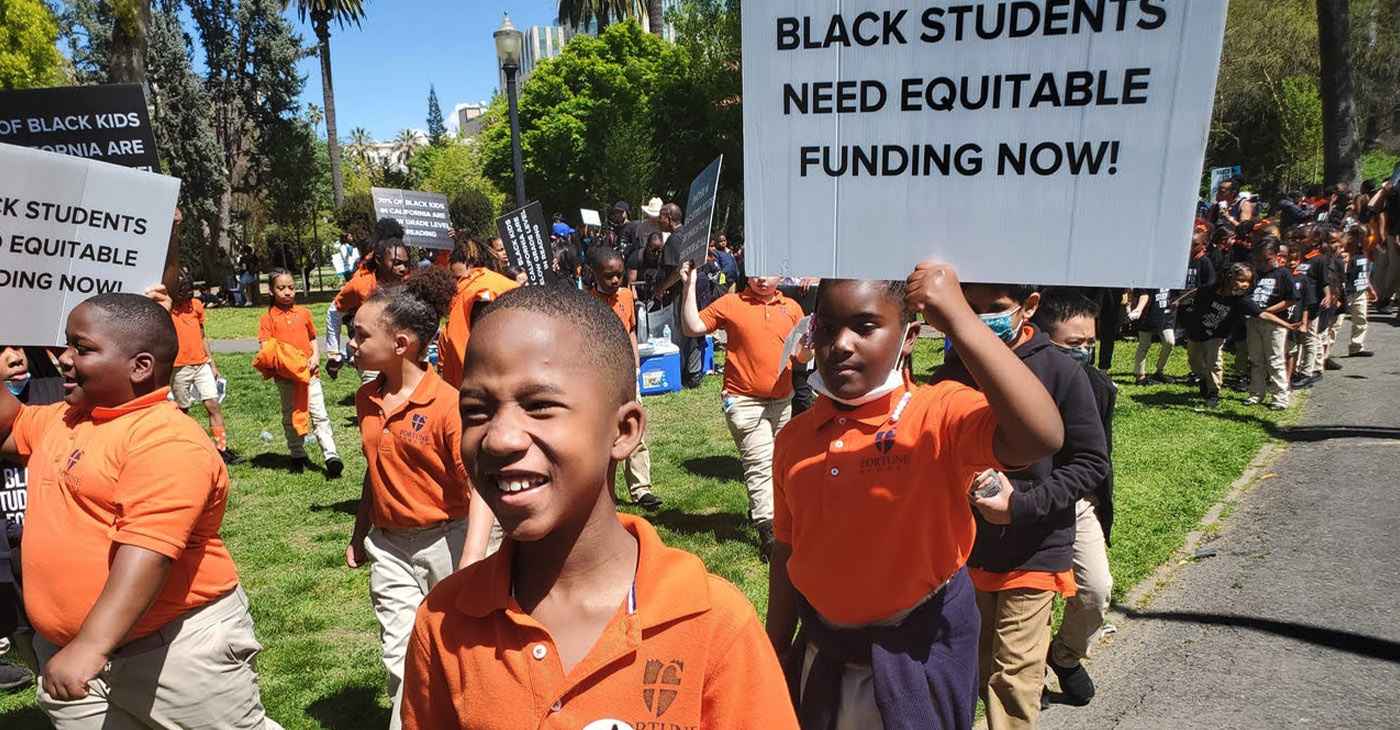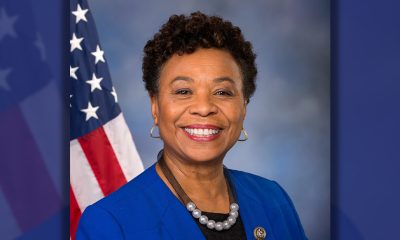California Black Media
Gov. Newsom and Advocates at Impasse Over Funding for Black Students Education
Last week, at the invitation of the Black in School Coalition (BISC), over 2,500 K-12 students, parents, education advocates, and civil rights leaders marched to the California State Capitol to demand increased funding for Black students in the state’s public schools. BISC is a statewide advocacy association consisting of 17 organizations from all parts of the education community, including teachers, administrators, local school districts and county board of education trustees, parents, civil rights, and faith groups.

Joe W. Bowers Jr. | California Black Media
Last week, at the invitation of the Black in School Coalition (BISC), over 2,500 K-12 students, parents, education advocates, and civil rights leaders marched to the California State Capitol to demand increased funding for Black students in the state’s public schools.
BISC is a statewide advocacy association consisting of 17 organizations from all parts of the education community, including teachers, administrators, local school districts and county board of education trustees, parents, civil rights, and faith groups.
The BISC marchers were calling on Gov. Gavin Newsom and the California Legislature to not move forward with the “Equity Multiplier” proposed in the governor’s Education Budget, which is supposed to be a substitute for Assembly Bill (AB) 2774 authored by Assemblymember Akilah Weber (D – La Mesa).
AB 2774 would have guaranteed funding for California’s lowest performing group, Black students, but advocates say, Newsom’s proposal falls short of that goal.
Because Newsom raised concerns that targeting funds to a specific group of students would violate Prop 209, which prevents preferential treatment based on race, Weber withdrew AB 2774. In exchange, Newsom agreed to increase funding for Black students under the Local Control Funding Formula (LCFF) in the 2023 budget.
The LCFF is a state law that provides funding to local school districts based on the needs of their students. California’s highest-needs student populations receiving supplemental funding for additional support are English Language Learners, low-income students, and children in foster care or homeless youth. However, despite chronic underperformance, Black students are not identified as a high-needs population for funding.
According to state data, in the 2021-22 academic year, 30% of California’s Black students met English standards and 15% met math standards, compared to 61% and 48% of White students meeting reading and math standards, respectively.
The equity multiplier proposal provides $300 million in ongoing Proposition 98 funding to the LCFF to accelerate gains in closing opportunity and outcome gaps. The funds are allocated to school districts with schools serving high concentrations of students eligible for free meals.
The equity multiplier is part of Newsom’s plan to overhaul how the state can hold districts and schools accountable for student performance, with particular attention to racial disparities. According to Newsom’s office, 95% of Black students in California will be impacted because they are enrolled in districts potentially facing new accountability requirements due to low performance.
Dr. Margaret Fortune, president and CEO of the charter school organization Fortune School of Education and the lead voice for BISC says Newsom’s proposal sounds good but does not reflect the intentions of Weber’s bill.
According to an analysis conducted by EdSource, the funding from Newsom’s proposal would benefit about 6% of Black students statewide and they would be receiving an estimated $18 million out of $300 million proposed. Overall, the proposal targets just 5% of students in the state in about 800 schools and the students reached in those schools are mostly Latino.
To address this disparity in funding for Black students not in low-income schools, BISC has developed an alternative plan to the Equity Multiplier. It proposes additional funding for any group not already funded that scores below the state average on any two metrics on the California School Dashboard. Based on this year’s dashboard results, Black and Native American students would qualify.
Because students who have received LCFF funding have shown progress and improved outcomes due to concentrated resources aimed at their improvement, BISC’s funding alternative intentionally provides Black students the additional support that has benefited high-needs student groups.
Prior to their march on the Capitol, members of the BISC and students provided public comments at the State Assembly’s education budget committee hearing in support of their alternative budget proposal.
Fortune suggested to the committee that the $300 million in the governor’s equity multiplier proposal be directed to student groups who perform below the state average on two or more state indicators on the California school dashboard. This would increase per-student funding from $713 under the governor’s proposal to $3,318 for students in California with the greatest academic needs.
Under the BISC alternative plan, an additional 81,617 Black students and 8,807 Native American students would be eligible for this funding, compared to an additional 22,699 Black students and 1,806 Native American students under Newsom’s proposal.
Christina Laster, Western Regional Education Director of the National Action Network, stated that not many Black students attend the low-income schools targeted by the governor’s equity multiplier. Instead, she recommends focusing on student groups who perform below the state average on two or more state indicators on the California school dashboard. This would target student groups in the most academic need based on their performance, not their race.
Dr. Ramona Bishop, CEO of ELITE Public Schools, urged the Legislators to consider the BISC alternative proposal for the equity multiplier, which would address the needs of the students who stood behind her as she spoke. She emphasized that all Black students in the state deserve care, attention, and the best efforts of those in power.
Izzy Gardon, a spokesperson for the governor said, “We share the ultimate goal of the Black in School Coalition to eliminate opportunity and achievement gaps for Black students. However, we continue to believe that our more comprehensive and legally sound proposal is a better option than AB 2774 and its related alternative proposal. We are not alone in that belief — as I believe you have seen, we have the support of members of the CLBC (California Black Legislative Caucus including Weber), CAAASA (California Association of African American Superintendents), the Superintendent of Public Instruction (Tony Thurmond) and many others.”
So BISC and Newsom are at an impasse at what is the best way to direct state funding for educating Black students in the public schools.
BISC wants funding targeting Black students based on their need for support due to poor academic performance, while Newsom’s Equity Multiplier focuses on schools with high concentrations of poverty, impacting about 6% of the state’s Black students.
Newsom is concerned about the legal implications of funding aimed at specific racial groups and aims to reform the LCFF to address underperforming racial groups. BISC, on the other hand, is focused solely on Black student funding and not on reforming LCFF.
But the California Department of Justice (DOJ) in a preliminary report it wrote for the Task Force to Study and Develop Reparation Proposals for African Americans recommended funding Black students through the state’s funding formula, suggesting that Newsom should not be so concerned about violating Prop 209.
A recent report from the Legislative Analyst’s Office complicates the debate by noting that high-poverty schools already receive targeted funding and recommending that the Legislature not approve funding for the Equity Multiplier.
Until a solution to the impasse is achieved, the state must persist in its efforts to identify and implement the appropriate policy to assist its Black students in improving their academic performance, based on their individual needs rather than their race.
Activism
Oakland Post: Week of April 17 – 23, 2024
The printed Weekly Edition of the Oakland Post: Week of April 17 – 23, 2024

To enlarge your view of this issue, use the slider, magnifying glass icon or full page icon in the lower right corner of the browser window. ![]()
California Black Media
Yahushua’s Law: Senate Advances Bill to Protect Students from Extreme Weather
In a significant move towards student safety, the California Senate Education Committee passed Senate Bill (SB) 1248, also known as Yahushua’s Law, on April 3. The bill is named in memory of Yahushua Robinson, a 12-year-old student from Lake Elsinore, who tragically died due to a heat-related illness during a physical education class in 2023. It is a pioneering effort to prevent similar incidents in the future.

By California Black Media
In a significant move towards student safety, the California Senate Education Committee passed Senate Bill (SB) 1248, also known as Yahushua’s Law, on April 3.
The bill is named in memory of Yahushua Robinson, a 12-year-old student from Lake Elsinore, who tragically died due to a heat-related illness during a physical education class in 2023. It is a pioneering effort to prevent similar incidents in the future.
Authored by Senator Melissa Hurtado (D-Bakersfield) and co-authored by Assemblymember Akilah Weber, M.D. (D-La Mesa), SB 1248 directs the California Department of Education to develop comprehensive guidelines for schools regarding student activity during all extreme weather conditions.
“No student should ever lose their life on campus to extreme weather when we can take steps to protect them by preparing statewide plans to minimize exposure to the most harmful elements of exposure,” Hurtado said after introducing SB 1248.
The bill stipulates that schools must implement safety measures which include monitoring weather forecasts, postponing or relocating outdoor activities during hazardous conditions, and ensuring students have proper hydration and access to shade. It also requires schools to establish clear communication plans to keep parents, teachers, and students informed about potential weather hazards.
Supporters of the bill include the Robinson family, advocate Christina Laster, Bold Enterprises LLC, California Black Women’s Collective Empowerment Institute, Familias Empoderadas del Valle Central National Action Network, The Black Student Advocate, and the Ventura County Alumnae Chapter of Delta Sigma Theta Sorority.
Thanking Hurtado for introducing this crucial legislation, Weber said, “The story of Yahushua Robinson last year was heartbreaking. We have protections for farm workers and other industries in the case of extreme weather, now climate change is forcing us to also extend similar protections to students at school.”
California Black Media
Expert Advice: How to Protect Yourself From Bias and Backlash at Work
As reports of antisemitic and Islamophobic threats and acts of hate and violence increase in California and across the country, the California Commission on the State of Hate (Commission) and California Civil Rights Department (CRD) continue to encourage Californians to take advantage of anti-hate resources available statewide, including the California vs Hate hotline and website. “The Commission on the State of Hate stands united in shared humanity with the people of California in denouncing violence and hate,” said Commission Chair Russell Roybal in a statement.

By Edward Henderson, California Black Media
As reports of antisemitic and Islamophobic threats and acts of hate and violence increase in California and across the country, the California Commission on the State of Hate (Commission) and California Civil Rights Department (CRD) continue to encourage Californians to take advantage of anti-hate resources available statewide, including the California vs Hate hotline and website.
“The Commission on the State of Hate stands united in shared humanity with the people of California in denouncing violence and hate,” said Commission Chair Russell Roybal in a statement.
“We recognize what is happening in the Middle East has devastated communities in California. Unfortunately, when these horrific events occur, instances of hate tend to rise as well. No person, whether they are Jewish, Muslim, Palestinian, Israeli, or perceived as members of any of these groups, should be subject to prejudice or violence,” he added.
“If you experience or witness hate in California, we encourage you to contact CA vs Hate to report the incident and get connected to support and resources.”
Title VII of the Civil Rights Act of 1964 prohibits discrimination in all aspects of employment, including hiring, firing, pay, job assignments, promotions, layoffs, training, fringe benefits, and any other term or condition of employment. This prohibition extends to discrimination based on religion, national origin, and race.
One form is the adverse treatment of an individual based on their actual or perceived religious practices or membership in a particular racial or national origin group.
Another form is adverse treatment based on the assumption that the individual holds certain beliefs because of their religion, national origin, or race. There can also be adverse treatment due to the individual’s actual or perceived association with, or relationship to, a person of a particular religion, national origin, or race.
The UCLA Center for Equity and Inclusion recommends four tactics to respond to workplace bias or hate.
Interrupt Early
Workplace culture largely is determined by what is or isn’t allowed to occur. If people are lax in responding to bigotry, then bigotry prevails.
Use or Establish Policies
Call upon existing policies to address bigoted language or behavior. Work with your personnel director or human resources department to create new policies and procedures, as needed. Also ask your company to provide anti-bias training.
Go Up the Ladder
If behavior persists, take your complaints up the management ladder. Find allies in upper management and call on them to help create and maintain an office environment free of bias and bigotry.
Band Together
Like-minded colleagues also may form an alliance and then ask the colleague or supervisor to change his or her tone or behavior.
CA vs Hate is a non-emergency, multilingual hate crime and incident reporting hotline and online portal. Reports can be made anonymously by calling (833) 866-4283, or 833-8-NO-HATE, Monday to Friday from 9 a.m. to 6 p.m. PT or online at any time. Hate acts can be reported in 15 different languages through the online portal and in over 200 languages when calling the hotline. For individuals who want to report a hate crime to law enforcement immediately or who are in imminent danger, please call 911. For more information on CA vs Hate, please visit CAvsHate.org.
-

 Activism4 weeks ago
Activism4 weeks agoOakland Post: Week of March 20 – 26, 2024
-

 #NNPA BlackPress3 weeks ago
#NNPA BlackPress3 weeks agoCOMMENTARY: D.C. Crime Bill Fails to Address Root Causes of Violence and Incarceration
-

 #NNPA BlackPress4 weeks ago
#NNPA BlackPress4 weeks agoFrom Raids to Revelations: The Dark Turn in Sean ‘Diddy’ Combs’ Saga
-

 #NNPA BlackPress3 weeks ago
#NNPA BlackPress3 weeks agoMayor, City Council President React to May 31 Closing of Birmingham-Southern College
-

 #NNPA BlackPress4 weeks ago
#NNPA BlackPress4 weeks agoCOMMENTARY: Lady Day and The Lights!
-

 Activism3 weeks ago
Activism3 weeks agoOakland Post: Week of March 27 – April 2, 2024
-

 #NNPA BlackPress4 weeks ago
#NNPA BlackPress4 weeks agoBaltimore Key Bridge Catastrophe: A City’s Heartbreak and a Nation’s Alarm
-

 #NNPA BlackPress4 weeks ago
#NNPA BlackPress4 weeks agoBaltimore’s Key Bridge Struck by Ship, Collapses into Water
















































